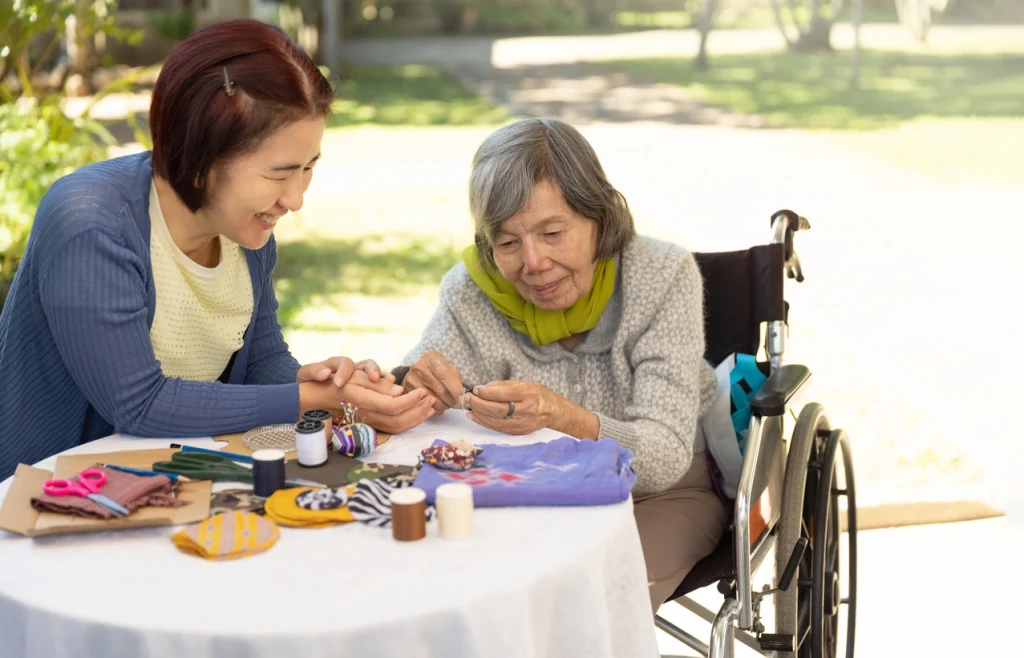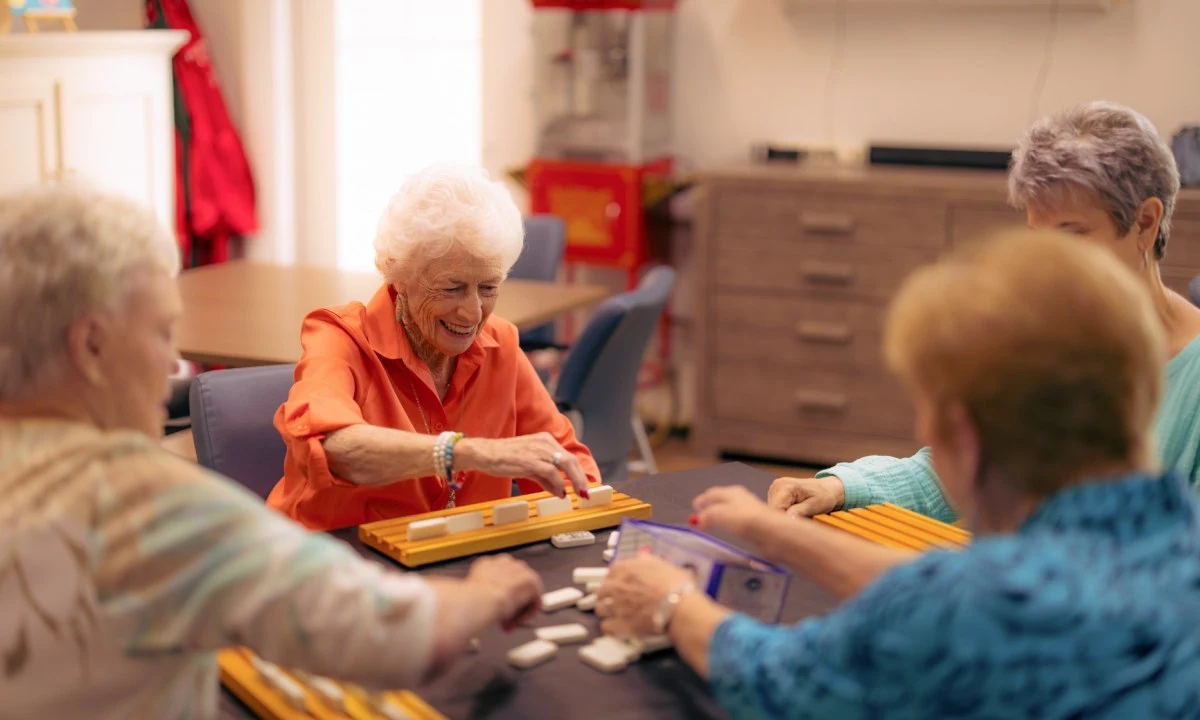
Simple Hobbies for Elderly With Dementia
It is very important to be familiar with hobbies for elderly with dementia. Dementia in the elderly is a common problem that leads to the gradual loss of cognitive abilities such as memory, concentration, decision-making and thinking skills. Alzheimer’s disease is one of the most common types of dementia. Factors such as genetics, lifestyle and general health conditions can play a role in the occurrence of dementia.
Symptoms of dementia in the elderly usually appear gradually and over time. These symptoms can affect memory, thinking, behavior and social abilities. Dementia includes a range of cognitive disorders and each person may experience different symptoms. Fortunately, with scientific advances and education dementia care for elderly quality of life, the quality of life of people with this disease can be improved. In the rest of this article from humanhealthmag, we will get acquainted with some other hobbies for people with dementia.
Symptoms of Dementia in the Elderly
Before introducing hobbies for elderly with dementia, let’s first get acquainted with the symptoms of dementia. The most common symptoms of this disease are as follows:
- Memory loss: One of the first and most obvious signs of dementia is short-term memory loss. People may forget things like appointments, names, or recent conversations. They may also ask repeated questions repeatedly or lose personal objects. Fortunately, with the help of Easy Recipes for Seniors with Dementia, the progression of the disease can be stopped.
- Impaired language abilities: People with dementia may have difficulty finding the right words, following conversations, or understanding what others are saying. They may speak incomplete or incomprehensible sentences and have difficulty communicating effectively.
- Difficulty concentrating and planning: People with dementia may have difficulty performing everyday tasks that require concentration or planning, such as managing finances, paying bills, or planning a trip. The ability to solve problems and make decisions may also be reduced.
- Disorientation: Another common symptom of dementia is getting lost in familiar places or losing track of time. People may have trouble recognizing familiar places or finding familiar directions. They may also be confused about dates and days. Children of these people can learn how to move a parent with dementia to assisted living and transfer their parents to reputable treatment centers.

- Behavioral and personality changes: Dementia can cause significant changes in a person’s behavior and personality. A person may become irritable, anxious, depressed, or apathetic. They may also exhibit strange or inappropriate behavioral habits, such as poor personal hygiene or aggression.
- Suspicion and hallucinations: In some cases, especially in the advanced stages of dementia, people may experience hallucinations (seeing or hearing things that are not there) or become suspicious. They may accuse family members or friends of theft or conspiracy.
- Sleep disturbances: Sleep problems such as insomnia, frequent nighttime awakenings, or excessive daytime sleepiness are also common symptoms of dementia. Some patients may experience restlessness and wandering at night, which is called “sundown syndrome.”
Games and Hobbies for Elderly With Dementia
Games such as hobbies for elderly with dementia are among the activities that can entertain and engage the human mind, and more importantly, games can help stimulate the brain, especially for older adults and those at risk of dementia. For example, a 2019 study examined the effect of computer-based cognitive training in the areas of reasoning, memory, language, and attention on the progression of mild cognitive impairment in the elderly. The results showed that this training increased the volume of gray matter in the brain and could also help maintain general cognition.
For example, Doing activities that challenge the mind, such as solving puzzles, brain games, reading books, memory exercises for elderly with dementia, and learning new skills can help improve cognitive health. Learning a new language or music are also effective methods. According to reliable research sources, when patients in the early and middle stages of dementia use mental games, they can improve a wide range of cognitive abilities, such as short-term memory, response time, problem solving, and logical reasoning. Three types of games that can be used in this group of people are:
- Board games: These games can help with cognitive functions such as memory, communication, and emotion regulation.
- Video games: Video games can directly personalize specific cognitive functions such as memory and reasoning.
- Virtual reality games: Depending on the type of game, they can lead to cognitive and physical enhancement.
Dementia Management and Treatment
In addition to hobbies for elderly with dementia, there are many treatments available to help control and manage the disease. For example, some medications, such as cholinesterase inhibitors (such as donepezil) and memantine, can help reduce symptoms of dementia and improve cognitive function in the early and middle stages of the disease. These medications can slow the progression of symptoms and improve memory and cognitive abilities in some patients, but their effects are usually temporary. Also, controlling related diseases, such as high blood pressure, diabetes, and high cholesterol, can help reduce brain damage and prevent the patient’s condition from getting worse.

Preventing strokes and improving blood flow to the brain, especially in cases of vascular dementia, is very important. Mental, social, and physical activities can help seniors slow the progression of the disease. Participating in activities such as exercise, yoga, reading, brain games, and social interactions can help improve cognitive function. Techniques such as cognitive stimulation, music therapy, art therapy, and the use of new technologies such as digital games to enhance memory can be helpful in reducing symptoms of dementia and improving patients’ communication and social skills.
Criteria for Selecting Hobbies for Elderly With Dementia
The idea that entertainment is only for young people and that when a person reaches old age, they must give up all the pleasures of the world is completely wrong. If there is an elderly person with dementia in your circle, you should do your best to ensure that they get the most out of their favorite hobbies. Of course, it is natural that the requirements of this age period should also be considered when selecting hobbies for elderly with dementia. Among the most important criteria for selecting types of hobbies for the elderly are the following:
- Choose games that are compatible with the physical conditions of the elderly.
- Hobbies should eliminate any sense of depression in the elderly.
- Elderly people must definitely be able to do hobbies to create a sense of success in them.
- Creating a sense of independence in the leisure and entertainment of the elderly is an essential issue.
- The more interaction the elderly have with others in the form of games, the more suitable it is for boosting their spirits.
- Go for brain games that engage the memory of the elderly.
- Consider entertainment as occupational therapy for the elderly to strengthen motor skills.
- Entertainment should be in accordance with the cultural and social conditions of the elderly.
- Go for entertainment that evokes the sweet experiences of the elderly’s youth.
In addition to all the criteria we have mentioned for choosing types of entertainment for the elderly, you should not neglect one important point. Even if you consider the best and most expensive entertainment in the world for the elderly, you cannot imagine a desirable result unless it is compatible with their personal interests. Therefore, try to give priority to programs that are in their interest as much as possible so that they can cooperate with you more easily.
Concluding Remarks
In this article, we talked about hobbies for elderly with dementia. In general, although there is no definitive cure for dementia, with proper management and careful care, symptoms can be controlled and the severity of the disease can be reduced. A lot of scientific research is being done to find new ways to treat dementia. Some of this research focuses on genetic methods, immunotherapy, and new drugs that look promising, but there are still no definitive results.
Could you help us make this content even better? What do you love, and what can we improve? Share your thoughts below, feedback is the key to creating better content for YOU. If you also have an experience in this regard, please share it with us and others.

Frequently Asked Questions
Is Dementia Curable in the Elderly?
Dementia in the elderly, especially in cases such as Alzheimer’s disease, cannot be completely cured. These diseases are generally progressive, meaning they get worse over time, and there is currently no definitive treatment to stop or completely restore brain function. However, there are strategies that can help slow the progression of the disease and improve the quality of life for those affected.
What are the Best Vitamins for Preventing Alzheimer’s?
Research shows that people who eat a diet rich in vitamins C and E have a 20 to 25 percent lower risk of developing Alzheimer’s disease. In addition, vitamin E and C levels are often low in people with dementia.
Is Dementia Preventable if Detected Early?
No, our experts don’t yet know how to prevent dementia. But some recent evidence has shown that finding the disease early can lead to better treatment options and slow the progression of the disease.
Is Vitamin D Good for Preventing Dementia?
Vitamin D has been used for centuries to prevent and treat dementia. It is produced in the skin by exposure to sunlight. The human body uses 100% of its vitamin D. 10 to 15 minutes of sun exposure daily is enough to provide the body with this vitamin.
